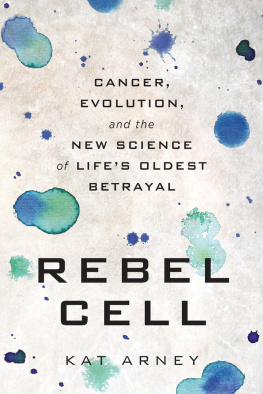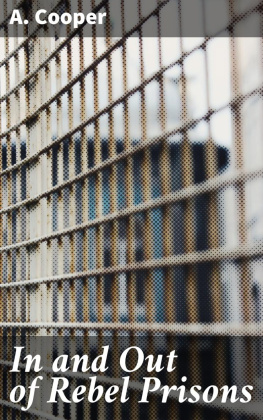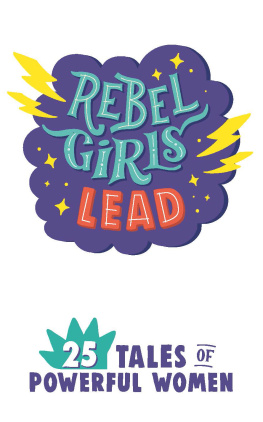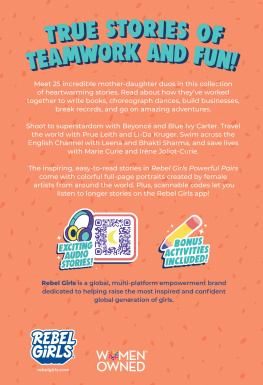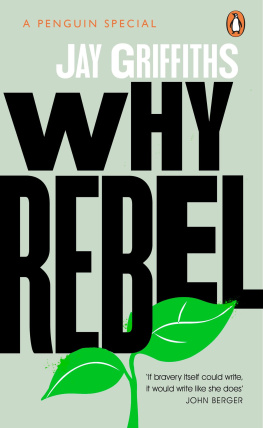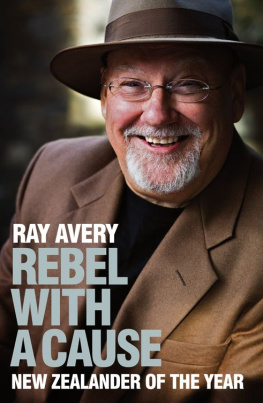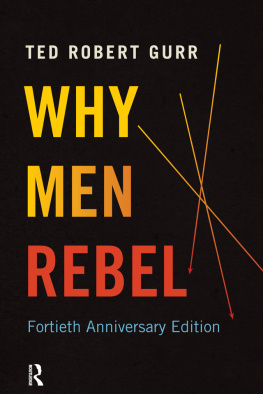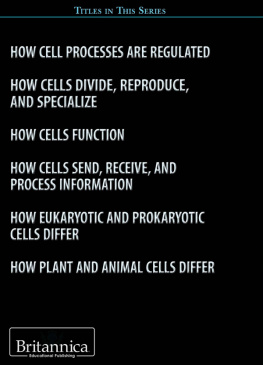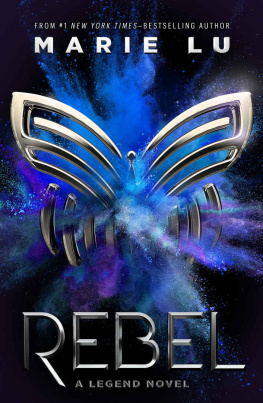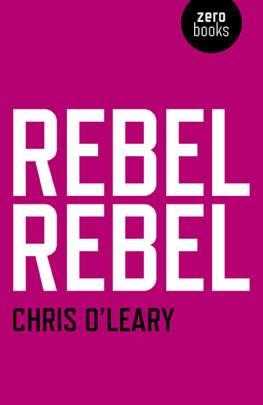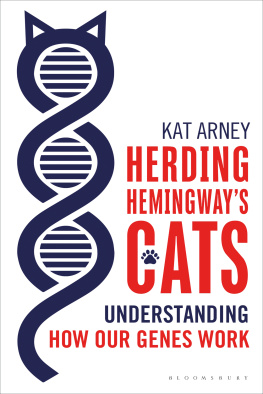Kat Arney - Rebel Cell
Here you can read online Kat Arney - Rebel Cell full text of the book (entire story) in english for free. Download pdf and epub, get meaning, cover and reviews about this ebook. year: 2020, publisher: BenBella Books, Inc., genre: Romance novel. Description of the work, (preface) as well as reviews are available. Best literature library LitArk.com created for fans of good reading and offers a wide selection of genres:
Romance novel
Science fiction
Adventure
Detective
Science
History
Home and family
Prose
Art
Politics
Computer
Non-fiction
Religion
Business
Children
Humor
Choose a favorite category and find really read worthwhile books. Enjoy immersion in the world of imagination, feel the emotions of the characters or learn something new for yourself, make an fascinating discovery.
- Book:Rebel Cell
- Author:
- Publisher:BenBella Books, Inc.
- Genre:
- Year:2020
- Rating:3 / 5
- Favourites:Add to favourites
- Your mark:
- 60
- 1
- 2
- 3
- 4
- 5
Rebel Cell: summary, description and annotation
We offer to read an annotation, description, summary or preface (depends on what the author of the book "Rebel Cell" wrote himself). If you haven't found the necessary information about the book — write in the comments, we will try to find it.
Rebel Cell — read online for free the complete book (whole text) full work
Below is the text of the book, divided by pages. System saving the place of the last page read, allows you to conveniently read the book "Rebel Cell" online for free, without having to search again every time where you left off. Put a bookmark, and you can go to the page where you finished reading at any time.
Font size:
Interval:
Bookmark:
Contents

This book is packed with big ideas about life. Every chapter has something in it which made me think wow. Having worked in a major cancer charity for many years, Arney writes with genuine in-depth understanding and is a perfect guide.
DANIEL M. DAVIS, author ofThe Beautiful Cure
Better than just a history or scientific rundown of cancer, Kat Arney presents a philosophy for how to think about cancer.
ZACH WEINERSMITH, coauthor of Soonish and creator of Saturday Morning Breakfast Cereal
Kat Arney is a science writer for all of usa powerful and talented storyteller.
STEPHEN MCGANN, author and actor on Call the Midwife
A crystal clear reappraisal of the story behind that word we fear to mention. If you want to know your enemy, read this book. A myth-busting masterclass in science writing.
DALLAS CAMPBELL, science broadcaster and author of Ad Astra
Forget magic bullets and much-hyped miracle cures; to improve the chances of cancer patients we need revolutionary new thinking. And that new thinking, Arney forcefully argues, is evolutionary This lively, scholarly, and accessible book should be essential reading for oncologists the world over and powerfully demonstrates that nothing in biology, cancer included, makes sense except in the light of evolution.
LAURENCE D. HURST, director of the Milner Centre for Evolution and president of the Genetics Society
Kat Arney does it again: taking the complex and making it easy to grasp, demystifying the mysterious, asking the right questions and finding the surprising answersand all with rollicking good humor and bonhomie. The war on cancer would itself be far more advanced if its practitioners knew how to communicate with us and each other as well as Kat does in this mind-thrilling page turner.
MARK STEVENSON, futurist and author of We Do Things Differently: The Outsiders Rebooting Our World

This book is for informational purposes only. It is not intended to serve as a substitute for professional medical advice. The author and publisher specifically disclaim any and all liability arising directly or indirectly from the use of any information contained in this book. A health care professional should be consulted regarding your specific medical situation. Any product mentioned in this book does not imply endorsement of that product by the author or publisher.
Rebel Cell copyright 2020 by Kat Arney
All rights reserved. No part of this book may be used or reproduced in any manner whatsoever without written permission of the publisher except in the case of brief quotations embodied in critical articles or reviews.

BenBella Books, Inc.
10440 N. Central Expressway, Suite 800
Dallas, TX 75231
www.benbellabooks.com
Send feedback to
BenBella is a federally registered trademark.
First E-Book Edition: September 2020
Library of Congress Cataloging-in-Publication Data is available upon request.
LCCN: 2020941481
ISBN 9781950665303 (trade paper)
ISBN 9781950665518 (ebook)
Originally published by The Orion Publishing Group, Ltd.
Cover illustration by Sarah Avinger and texture by Lost & Taken
Typeset by Input Data Services Ltd, Somerset
Printed by Lake Book Manufacturing
Distributed to the trade by Two Rivers Distribution, an Ingram brand www.tworiversdistribution.com
Special discounts for bulk sales are available. Please contact .
CONTENTS
To life, love, and loss
Turning and turning in the widening gyre
The falcon cannot hear the falconer;
Things fall apart; the center cannot hold;
Mere anarchy is loosed upon the world
W.B. Yeats
Cancer starts when a cell picks up genetic mutations and multiplies out of control.
I dont know how many times Ive written some variation of that sentence during my career as a science writer, including the twelve years I spent on the communications team at the worlds leading cancer research charity. Never once did I stop to consider what it really means. Or that it might be wrong.
Cancer is a disease that affects us all. Even if youve been lucky enough not to see its effects up close, either in yourself or in someone you love, cancer is a global health problem that kills millions of people around the world every year. Scientists and doctors have been trying to discover its causes, consequences, and cures for thousands of years, arguably only making any significant progress in the latter half of the twentieth century. Today, around half of the people diagnosed with cancer in the UK can expect to survive for ten years or morea figure thats only likely to rise in the future. To an optimist, this is a glass half full.
We already know how to cure cancer. Or rather, we already know how to cure some cancers. The best way is to spot them as soon as possible and remove them with careful surgery before theyve started spreading round the body (known as metastasis). Radiotherapy can be curative and hormone therapy can be very effective for keeping breast and prostate cancers at bay, if used at the right time. Many blood cancers respond strikingly well to chemotherapyparticularly in childrenand drugs can completely cure testicular cancer even at an advanced stage. There have been startling results with the new generation of immunotherapies, yet they currently only work for fewer than one in five patients who take them. But for most of the unlucky ones whose disease has started its unrelenting march through the body, the question changes from Will I get better? to How long have I got left? Not if, but when.
This is pretty much the same situation weve been in since President Richard Nixon infamously declared War on Cancer in 1971. Seeking a distraction from the conflict in Vietnam and hoping to capitalize on the pioneering spirit engendered by the recent Apollo moon landings, Nixon pledged millions of dollars toward the quest for a cure within a decade. Alas, in an unfortunate parallel with the situation in the Far East, he had wildly underestimated his enemy. In 1986, statistician John Bailar ran the numbers: despite a few successes here and there, the vast majority of late-stage cancers still remained stubbornly incurable. In Bailars own words, the War on Cancer was to be judged a qualified failure.
Although theres been a fair bit of successful tinkering around the edges for certain types of cancermost notably malignant melanomaa close look at todays statistics reveals the same patterns. More and more people are being diagnosed at an early stage when treatment is much more likely to be effective, boosting the overall figures. But survival from advanced metastatic cancer is still likely to be measured in months or single-digit years rather than decades.
The big problem is that precision tools of surgery and radiotherapy are virtually useless against rampant disease, and chemotherapy is a blunt weapon based on the principle of killing cancer cells faster than it kills the healthy ones. Even when it works, the tumors almost inevitably come backweeks, months, or even years laterand every subsequent round of treatment is a more brutal assault on health, with diminishing returns. The empty half of the glass is proving difficult to fill.
Next pageFont size:
Interval:
Bookmark:
Similar books «Rebel Cell»
Look at similar books to Rebel Cell. We have selected literature similar in name and meaning in the hope of providing readers with more options to find new, interesting, not yet read works.
Discussion, reviews of the book Rebel Cell and just readers' own opinions. Leave your comments, write what you think about the work, its meaning or the main characters. Specify what exactly you liked and what you didn't like, and why you think so.

